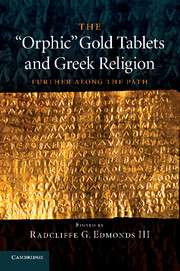Book contents
- Frontmatter
- Contents
- List of contributors
- Acknowledgements
- Note on abberivations
- PART I THE TABLET TEXTS
- PART II TEXTS AND CONTEXTS
- PART III SEMIOTIC AND NARRATIVE ANALYSES
- 8 Funerary gold lamellae and Orphic papyrus commentaries
- 9 Initiation – death – underworld
- 10 Sacred scripture or oracles for the dead?
- 11 Dialogues of immortality from the Iliad to the gold leaves
- 12 Poetry and performance in the Orphic gold leaves
- 13 Rushing into milk
- Compiled Bibliography
- Index
- Index locorum
12 - Poetry and performance in the Orphic gold leaves
Published online by Cambridge University Press: 04 February 2011
- Frontmatter
- Contents
- List of contributors
- Acknowledgements
- Note on abberivations
- PART I THE TABLET TEXTS
- PART II TEXTS AND CONTEXTS
- PART III SEMIOTIC AND NARRATIVE ANALYSES
- 8 Funerary gold lamellae and Orphic papyrus commentaries
- 9 Initiation – death – underworld
- 10 Sacred scripture or oracles for the dead?
- 11 Dialogues of immortality from the Iliad to the gold leaves
- 12 Poetry and performance in the Orphic gold leaves
- 13 Rushing into milk
- Compiled Bibliography
- Index
- Index locorum
Summary
Now that new texts brought to light within the past decade have restored Dionysus to the role once posited for him in the texts of the Orphic gold leaves, it is time to re-examine those enigmatic texts as being in some sense poems themselves. All significant advances on these texts have been made by assuming that their archetypes were in poetic form, used standard epic diction, and made sense. Yet no one has succeeded in explaining why these texts should have been in poetic form in the first place. Most scholars have been content to see these texts primarily as parasitic upon early hexametric poetry for their formulaic phraseology. That is to say, the compositors of these texts are believed by and large to have drawn rather arbitrarily or slavishly and mechanically upon earlier poetry for the form and language of these texts, producing at best a derivative hodge-podge of formulae pirated from the language of earlier, canonized poems.
I want to argue in this paper that this view is fundamentally flawed. The one feature shared by all the texts alike is that they prescribe actions to be performed and words to be spoken by an unnamed addressee in response to the utterances of an underworld speaker. I will argue that these utterances can be seen as a function of a real or imagined performative context: that is to say, that they presuppose a scenario of enacted drama and contain their own dramatic structure, in which the enactment of ritual is linked to the performance or inscription of a poetic text.
- Type
- Chapter
- Information
- The 'Orphic' Gold Tablets and Greek ReligionFurther along the Path, pp. 291 - 309Publisher: Cambridge University PressPrint publication year: 2011
- 16
- Cited by



